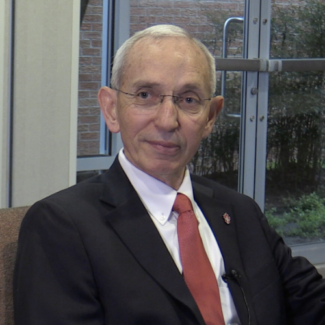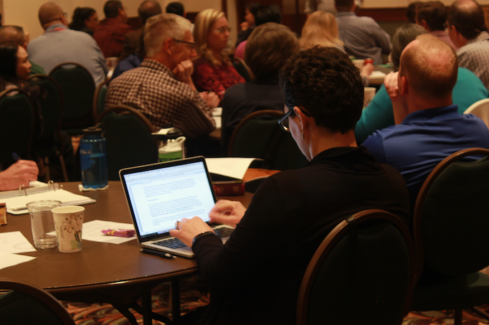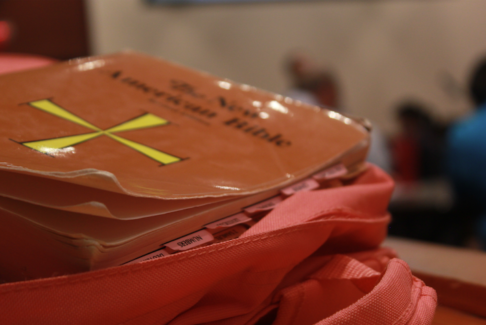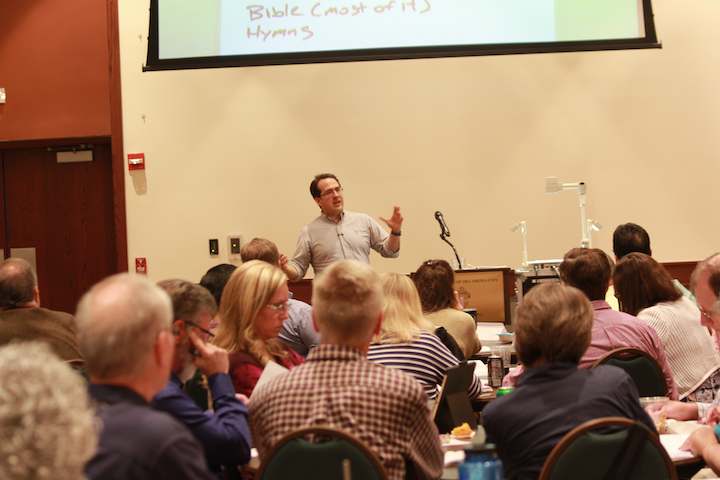The Newman School of Catholic Studies is now home to the Bachelor of Arts in Theology program for the Archdiocese of Oklahoma City.
Father Joseph Gile, S.T.D., associate professor of theology and priest of the Wichita diocese, was named dean of the new School of Catholic Studies at Newman January 2019.
The school houses theology, diaconate and pastoral ministry programs for undergraduate and graduate students and includes formation programs for seminarians in the dioceses of Wichita and Little Rock, Arkansas.
Deacon Norm Mejstrik is the director of permanent diaconate for the Archdiocese of Oklahoma City, which currently has 92 active deacons and 31 men in formation. Mejstrik is also a Newman alumnus with a degree in pastoral ministry.

Mejstrik said the Oklahoma City archdiocese relies on Newman University for intellectual formation in its partnership through the Blessed Stanley Rother Institute. This institute is named for the Oklahoma diocesan priest who was killed in his parish rectory in Guatemala in 1981 and was created to help pastors, deacons and the general public learn both the Spanish language and Hispanic tradition.
“We find now that there is a great demand for deacons and I think part of the reason why is that they are coming out of our program better prepared than in times past,” Mejstrik said. “They are better formed intellectually and even spiritually, and I think this speaks for the quality of instruction we receive from Newman.”
There are several requirements a deacon must meet. Deacons have to be at least 35 years old and practicing, baptized members of the Roman Catholic Church who have belonged to the church for at least five years before their ordination. They must also meet certain marriage, education and discernment requirements.
“We believe that for deacon candidates who are married, marriage is their first vocation,” Mejstrik explained. “We prioritize God first, then their marriage, their service and their diaconal ministry — in that order. For those who are called to serve as deacons, we want their wives to know how a deacon is formed, what is expected of them and for the wives to develop relationships with one another so that upon ordination and after, they have a natural built-in support group.

“We think it’s important for the wives to walk this journey of formation along with their husbands during the four years of formation,” he added.
Formation takes four years to complete and focuses on its four pillars: human formation, intellectual formation, spiritual formation and pastoral formation. The first year is spent in personal discernment, and if the person is called to be a deacon, he may spend the next three years in candidacy.
Deacons are typically assigned to individual parishes in the archdiocese and dedicate time to serving the poor and marginalized, serving in liturgy, Mass, funerals, baptisms and marriages. However, deacons are also ordained to preach and teach.
Soon-to-be deacons participate in 11 “formation weekends” each year. These weekends include dinner, prayer as well as spiritual and intellectual formation practices led by professors of the university. One consists of a spiritual retreat, while the other 10 weeks introduce instructional theology and topics including homiletics, how to do baptisms, funerals, serve at Mass and what is required to be a deacon.

“I feel like our men coming out of formation are much better prepared in faith and theology to do a better job of preaching and teaching in their ministries,” Mejstrik said. “They are also more deeply rooted in the faith and better able to do the ministries of a deacon: liturgy, word and charity, and especially word through the preaching and teaching elements of the diaconate ministry.
“We are very excited to have the quality of instruction that we’re receiving for the current class and classes to come.”
Gile said creating the Newman School of Catholic Studies is a great way to build a solid relationship between the Catholic community and Newman, and President Noreen M. Carrocci, Ph.D., agrees.
“It is a natural progression for Newman,” Carrocci said. “The programs offered in this new school embrace our Catholic identity and rich heritage and we are proud to bring this new academic option to the Wichita community, the region and all other communities we will be serving.”
Mejstrik added, “I once again express my appreciation to Newman and the partnership we have through the Rother Institute for the excellent instruction we receive in the intellectual formation. It’s a great partnership and we’re indebted to Newman University for what they provide to us.”

